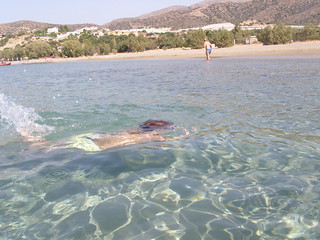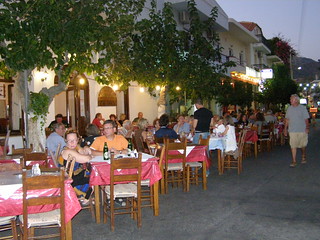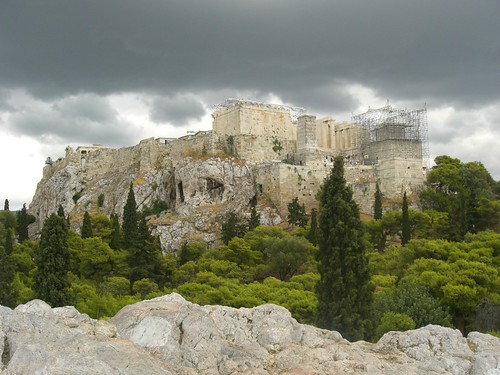Much of what is written these days about Greece is based on the global economic crisis. When people used to write about Greece pre-2009, it invariably involved Greece's evocative imagery.
The modern and ancient Greek worlds are integral threads in the history of Greece, but the labelling of Greece as 'modern' distances her from her past, as Richard Clogg notes in the first page of A Concise History of Greece (1992):

Greece is a land of images, which is what most people knew her by pre-2009. The first page of James Pettifer's The Greeks: The Land and People since the War (1993) reads as follows:
"Ever since the fall of the Greek mainland to Roman invaders, well before Christ was born, Greece has had a dual identity: Historia and Mythologia, the real and the imaginary... The Mythologia, the traditional images -
the sea, the mountains,
the Parthenon,
the islands,
the
strange-looking letters of the written language
- are overwhelmingly
strong, but images is all they are. They simplify reality, but they also
obscure it."
As I began reading the book, I did a reality check by pinching myself to see whether I was simply dreaming. This was quite unnecessary - my daily life is filled with such images. Far from obscuring my daily reality, these images form an integral part of it. They are strongly connected to the reasons why Greece has always been seen as an integral part of Europe.
But as Pettifer suggests, they are the very reasons why the outside world has misunderstood Greece and her part in Europe's evolution. These beautiful unique Greek images once obscured Greek reality to most foreigners, in the same way that live television coverage and other global mass media obscure today's Greek reality: it is difficult to place burning buildings, homeless people sleeping on the street and soup kitchens into the context of rural Cretan life.
Benjamin Broome also mentions Greek imagery in the first page of the introduction to Exploring the Greek Mosaic: a guide to intercultural communication in Greece (1996):



With the exception of food (for obvious reasons, these images only come to life for me when I am taking part in the same activity that tourists are doing in my country: having a break away from reality. To live in Greece, you have to remove the kitsch from your life to a certain extent.
©All Rights Reserved/Organically cooked. No part of this blog may be reproduced and/or copied by any means without prior consent from Maria Verivaki.
The modern and ancient Greek worlds are integral threads in the history of Greece, but the labelling of Greece as 'modern' distances her from her past, as Richard Clogg notes in the first page of A Concise History of Greece (1992):
All countries are burdened by their history, but the past weighs heavily particularly on Greece. It is still, regrettably, a commonplace to talk of 'modern Greece' and of 'modern Greek' as though 'Greece' and 'Greek' must necessarily refer to the ancient world. The burden of antiquity has been both a boon and a bane. The degree to which the language and culture of the ancient Greek world was revered throughout Europe (and, indeed, in the infant United States where ancient Greek was almost adopted as the official language) during the critical decades of the national revival in the early nineteenth century was a vital factor in stimulating in the Greeks themselves, or at least in the nationalist intelligentsia, a consciousness that they were the heirs to a heritage that was universally admired. Such an awareness had scarcely existed during the centuries of Ottoman rule and this 'sense of the past', imported from western Europe, was a major constituent in the development of the Greek national movement, contributing significantly to its precocity in relation to other Balkan independence movements.Due partly to her precious heritage, Greece became the first east European country in 1830 to win full independence: 150 years later, it became the first European country to enter the European Community.

Greece never went through the Renaissance, Reformation, Enlightenment and Industrial Revolution; during those periods, she was under Ottoman rule. Despite neighbouring Italy to the west, Greece's development hinted at eastern influences. (Above: Ioannina, Northern Greece).
Greece is a land of images, which is what most people knew her by pre-2009. The first page of James Pettifer's The Greeks: The Land and People since the War (1993) reads as follows:
"Ever since the fall of the Greek mainland to Roman invaders, well before Christ was born, Greece has had a dual identity: Historia and Mythologia, the real and the imaginary... The Mythologia, the traditional images -
the sea, the mountains,
 |
| Agious Apostolous beach is a short walk away from my home; the mountains are a short drive. |
the islands,
 |
| When the captain retired, he came back home to his island (Kithira), and built his house in the shape of a ship. |
 |
| Λ, Σ, Φ, and Ω: they're all Greek to me. |
As I began reading the book, I did a reality check by pinching myself to see whether I was simply dreaming. This was quite unnecessary - my daily life is filled with such images. Far from obscuring my daily reality, these images form an integral part of it. They are strongly connected to the reasons why Greece has always been seen as an integral part of Europe.
 |
| My daily reality: no shortage of garden-grown green vegetables, aged home-brewed wine and sourdough bread. |
Benjamin Broome also mentions Greek imagery in the first page of the introduction to Exploring the Greek Mosaic: a guide to intercultural communication in Greece (1996):
When I ask friends or acquaintances to describe their images of contemporary Ellada, better known to English language speakers as the country of Greece, their portrayals usually center on either Greek antiquity, island beaches, or a leaping Zorba. Most can readily point to contributions of fifth-century BC Greeks to the development of Western civilisation...
Accompanying these historical images are the mental pictures of the sun, sea, and villages of the Greek islands...
 |
| Falasarna, southern Hania |
During the day, sun worshippers soak up the therapeutic rays of the Mediterranean sunshine, and at night tourists fill the tavernas (restaurants) lining the waterfronts of fishing villages.


Paleohora, southern Hania
They leisurely pass the evening consuming simple but savory food cooked in olive oil and garlic, seasoned with herbs gathered from the mountains, and served with fresh seasonal fruits...
 |
| Horefto, Mt Pelion |
In magazines, tourist brochures, postcards, movies, and textbooks these images of Greece are spread to Europe, North America, and elsewhere, inviting all to visit what the Greek National Tourist Organization calls the 'Land Chosen by the Gods'.Whether these images are considered part of Greece's legendary or historical status, as a resident of Greece, I cannot escape them. Wherever I find myself outside my home, these are the images that I often confronted with. Despite this, I know that I do not dwell on them in my everyday life; images are not what life is made of.

I made this tablecloth while I was staying with my grandmother 'on holiday' in Greece in 1991, before Greece became my reality in 1992. This tablecloth has never been used - it doesn't suit the furnishings of my house. It would look good in a diaspora home.
©All Rights Reserved/Organically cooked. No part of this blog may be reproduced and/or copied by any means without prior consent from Maria Verivaki.


No comments:
Post a Comment